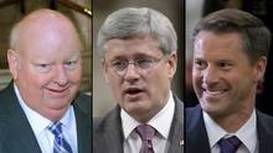
Like Members of Boards of Directors/Trustees, the Ministers of the Crown are responsible and accountable for the oversight of the professional staff who implement their policies and programmes. This principle of Ministerial responsibility is as fundamental to cabinet-style government as it is to the Boards of not-for-profit organizations. Failure to oversee in an effective manner is just as (or more) irresponsible than any inappropriate actions undertaken by staff. We know for the most part what did happen in the Duffy/Wright case, but what should have happened?
First, let's agree that when tasked with implementing a policy or solving a problem, the professional staff are responsible for the "how". There is nothing that destroys a Cabinet Minister's ability to oversee the quality of an operational initiative more thoroughly than by getting her or his hands dirty dictating the process by which an outcome is achieved. In the now infamous Mike Duffy case for example, how could the Prime Minister hold the members of the PMO accountable for a failed (or highly flawed) strategy to deal with the problem if the Chief of Staff can turn to him and say "I only did what you told me to do!"?
The only interest of the PM (or any Cabinet Minister) in the means by which the administration achieved its objective is to ensure that it was effective (we got there!); it was prudent (you didn't bankrupt/expose us to reach the goal); and, that it was ethical (you didn't cheat). I think that we can assume that in the Duffy case that neither the second nor the third criteria were met. The Prime Minister has told the Commons many times that he had determined, as the expected outcome, that Mike Duffy's expense claims would be paid back in full. And, at the end of the day, that is exactly what happened. The desired end had been reached, the public coffers had been compensated, and therefore, cased closed, the PM had done his job! Or had he?
While it is true that the Prime Minister set a goal, an "end" to be achieved, and while it is also true that he stood aside and let the his Chief of Staff and administration do its job, there is still one more piece to the governance puzzle. Once the end had been reached, it was the duty of the Prime Minister, like any Cabinet Minister, to determine how the desired outcome had been achieved. Upon investigation, it turned out that the approach had been neither prudent or particularly ethical! To begin with, it would appear, public pronouncements notwithstanding, that most of the problem-solving centred around who (other than Senator Duffy) would be on the hook for the money. Secondly, the final settlement of the issue also involved some creative whitewashing of the reports determining liability. In this case, while the PM might have been happy with the ends, he should not ethically have been able to live with the means. And, if he didn't know (as he has said many times) the means used to solve the problem, it was nevertheless his fiduciary duty to find out.
In other words, while Ministerial concern about administrative effectiveness should be primarily focussed on the extent to which the ends were met, there must also be a direct interest in the means by which the results were achieved. It is a critically important role of the Cabinet (like any Board) to ensure that those ends were reached in a prudent and ethical fashion. Regardless of whether you think that you know the answer already, you must ask the question. To not do so is the most basic violation of the principles of good governance and a failure to live up to fiduciary responsibilities.
In governmental, not-for-profit, and even corporate governance - the ends never justify the means, and the Sergeant Schultz approach to leadership ("I know nothing...") ranks right down there with ("I was only following orders") as the weakest line of defence.
Failure to oversee effectively is always, ultimately, a recipe for disaster. After all, the sub-prime lenders made a lot of money for their investors in 2007 but we all paid the price from their lack of prudence and ethics in the long run! Whether the current government will suffer similar consequences for their governance lapses, remains to be seen.

 RSS Feed
RSS Feed